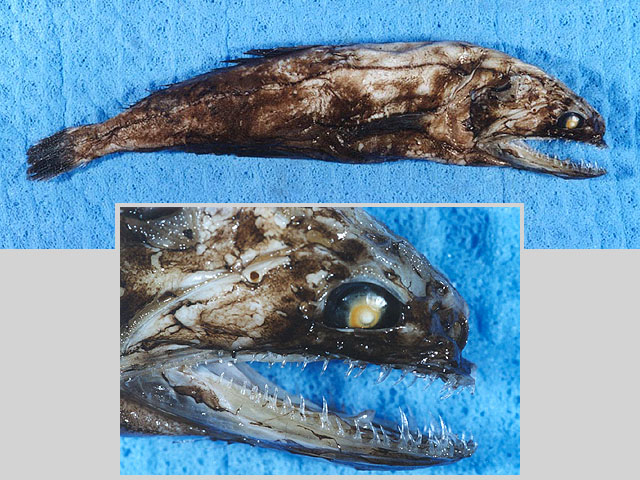| Chiasmodontidae (Snaketooth fishes) |
| 15.5 cm SL (male/unsexed) |
|
bathypelagic; marine; depth range 250 - 1370 m |
| Western Atlantic, United States to Brazil, continental shelf and Islands of the Caribbean in the west to Central Atlantic. A tentative identification of a juvenile from off Nigeria (5º56’ N, 4º03’ E) extends the species range to the Eastern Atlantic. |
|
Dorsal spines (total): 7-9; Dorsal soft rays (total): 19-22; Anal soft rays: 19-22; Vertebrae: 35-36. This species can be distinguished from other members of the Pseudoscopelus scriptus species group by a single character, anal-fin photophores (saf) not extending anterior to the level of anus (vs. extending anteriorly to level of or beyond anus). It is further distinguished from the other species by a set of characteristics: mesial series of premaxillary teeth in 3-4 rows (vs. single row in P. obtusifrons and P. pierbartus); mesial series of teeth in rows of 3-4 teeth gradually increasing of size from lateral to mesial (vs. in rows of 2-3 teeth, with internal row much larger than other teeth in P. cordilluminatus); total vertebrae 35-36, precaudal 18-19 (vs. 31, 14 in P. cephalus);pigmentation in the internal part of mouth exclusive to a dusky area in the skin covering regions with teeth on premaxilla and dentary (vs. internal area of mouth and gill arches black in P. sagamianus ) (Ref. 85782). |
| A meso- to bathypelagic species found at 250-1,370 m (mean 786 m); juveniles to about 30.0 mm are known from 95 to 590 m (Ref. 85782). |
|
Least Concern (LC); Date assessed: 15 July 2013 Ref. (130435)
|
| harmless |
Source and more info: www.fishbase.org. For personal, classroom, and other internal use only. Not for publication.
